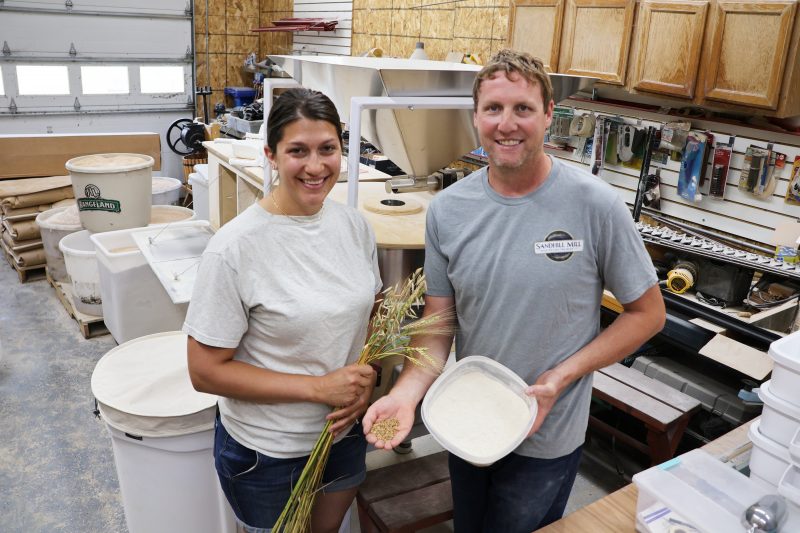MADISON, Minn. — “Welcome to my midlife crisis,” joked Peter Haugen on a Saturday morning in early August as a couple dozen farmers stood in a semi-circle around him and his wife, Brittany, at the edge of a 12-acre field south of Madison. The “crisis” Peter was referring to was what was growing in that field: emmer wheat, an ancient variety of grain sought after by specialty bakers. Over the hill was a 15-acre stand of einkorn wheat and down the road was a bright yellow stand of oats. Surrounding all these fields were crops more typically found in this part of the Midwest: corn and soybeans.
During a Land Stewardship Project (LSP) “Bringing Small Grains Back to Minnesota” meeting hosted by the Haugens and Madison Mercantile on Aug. 2, participants learned from other farmers, as well as a milling expert, about the potential for diversifying their agricultural enterprises by growing a type of crop that has all but disappeared from rotations in the Upper Midwest in recent decades. The loss of small grains such as wheat and oats is unfortunate, said Peter, given that he’s found that integrating these crops into his rotation helps disrupt pest cycles and builds healthy soil. Interest in small grains has been gaining momentum in Minnesota recently. During a similar “Bringing Small Grains Back to Minnesota” event held by LSP in Albert Lea in January, over 150 farmers and ag professionals gathered to learn how others are rebuilding markets and vital infrastructure for small grains.
The Haugen farm had grown small grains in the past, and recently got back into them initially to provide a wider planting window for growing cover crops. But they soon discovered that it was extremely difficult to sell specialty wheat and other small grains via local elevators. So, three years ago they launched Sandhill Mill, an on-farm stone ground mill that sells flour direct to customers. Since the mill was started, the Haugens have not been able to keep up with demand. Brittany is an avid baker, and has developed branded pancake and brownie mixes from the flour they mill.
“This small grains journey has brought our two worlds together,” said Peter. “Brittany’s learning a little about farming, I’m learning a little bit about baking.”
Although processing one’s own small grain production isn’t for everyone, it can be a great way to add value to a crop that otherwise might be undervalued in an undifferentiated market, said Noreen Thomas, who, along with her husband, Lee, owns Doubting Thomas Farms near Moorhead, Minn. During the past three decades, Doubting Thomas has developed a diverse organic operation that raises a variety of crops, including small grains. The farm has some of its small grains processed off-farm into flour and cereal, which it markets locally and across the country.
“Every time you clean or process grain, you add value to it,” Thomas told the meeting participants who gathered at Madison Mercantile after the Haugen field tour.
Gilbert Williams agrees. In 2009, he and a partner launched Lonesome Stone Milling in southwestern Wisconsin. During the next dozen years, the mill developed a demand for locally produced small grains by, among other things, using marketing and packaging that informed consumers about who the individual farmers were that supplied the grain. Williams told participants in the Aug. 2 meeting that there is a growing subset of consumers that want the kind of healthy food that can be provided by a system that produces and processes small grains locally.
Focusing on health and the mission of supporting local farmers will get buyers’ initial attention, but “flavor will bring your customers back,” and a mill operator must focus on quality control and understanding food safety rules, said Williams, who sold his mill to Meadowlark Farm and Mill in Ridgeway, Wis., a few years ago. As the Haugens have discovered, online/social media marketing has been a major boon to people who are selling value-added specialty grain products.
“I think the market for this is still broad,” said Williams.
During the LSP field day and meeting, farmers and presenters discussed the barriers that stand in the way of getting more small grains integrated back onto area farms. Lack of a regional infrastructure that supports transportation, storage and marketing of small grains, as well as how government programs related to initiatives like crop insurance favor corn and soybeans, are significant problems, they said. And although barriers around marketing, for example, can be overcome via on-farm milling and online marketing, such a strategy is not feasible for everyone.
What’s needed is a general infrastructure that can support diversifying cropping systems in the state, said Laura Schreiber, LSP’s government relations director. That’s why it’s important for farmers and others who want to see more diversity on the landscape to support state and federal policies that promote integrating crops like wheat and oats into a corn-soybean rotation, she said. Working with its allies, LSP has had success during recent sessions of the Minnesota Legislature in getting public support for farmers who want to sell direct to schools and other institutions and who are interested in setting up local processing and aggregation systems.
“One of the common inflection points for addressing these issues is policy,” she said, adding that agriculture makes up the smallest portion of the Legislature’s regular budget outlays. “That’s ironic, given what a major role agriculture plays in the state’s economy. We need to make it a priority.”
-30-
